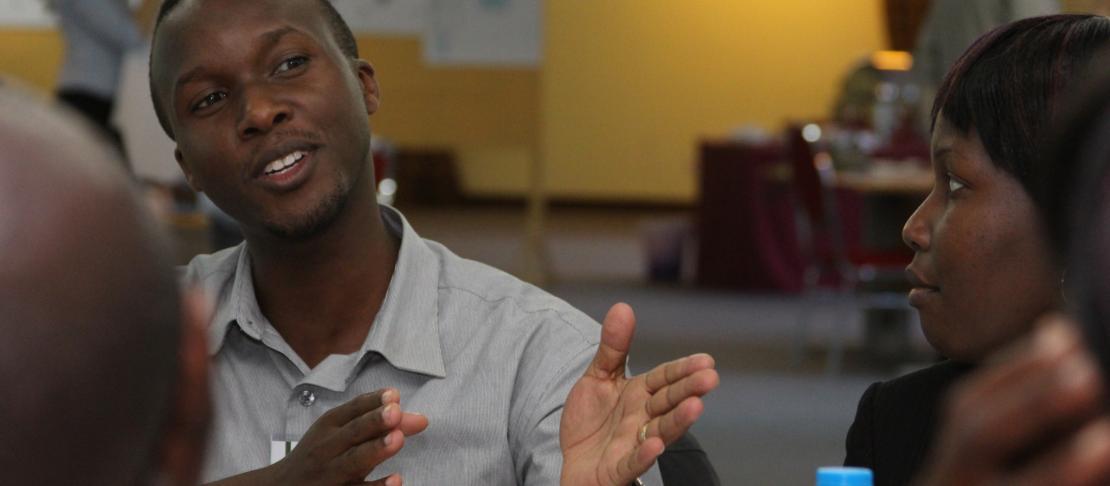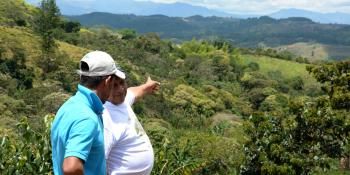Putting policies to the test: scenarios on food security, environments and adaptation

Decision-makers and researchers from across the East African Great Lakes region met in Entebbe, Uganda in late June to discuss what the future might hold in terms of development, agriculture and environmental change.
When populations increase, urban centres grow, agriculture and other sectors expand and climate change becomes an increasing concern, what trade-offs between ensuring better livelihoods for the vulnerable and safeguarding biodiversity and ecosystem services emerge? Where can environmental protection and sustainable agricultural development be combined?
This June came together for a
rganized by the UNEP World Conservation Monitoring Centre (UNEP-WCMC), the Albertine Rift Conservation Society and the CGIAR Research Program on Climate Change, Agriculture and Food Security (CCAFS) Scenarios team, the workshop purpose was to discuss what the future might hold in terms of agriculture and environmental change, using research to develop important policy questions in the face of an uncertain future.
Multiple future worlds
Marieke Sassen, programme officer at UNEP-WCMC, said: “One of the goals of this workshop was to validate the work that we have done modelling future scenarios, their consequences for land-use change and subsequent potential implications for biodiversity and ecosystem services. We also wanted to get regional input on the main areas of concern and their priorities in biodiversity and ecosystem services in relation to food security and development.”
Watch video from the Great Lakes meeting:
The group of participants used scenarios of the future of the Great Lakes region, and their representation in the form of maps of land use change and of impacts on biodiversity and ecosystem services. The maps represented multiple future “worlds,” which each offered different challenges for the decision-makers, as well as showing some common challenges that may have to be dealt with whatever the future might bring.
Forward looking is very critial according to George Wamukoya, climate advisor for the Common Market for Eastern and Southern Africa (COMESA):
Countries sometimes make policies without forward looking. And after one or two years they realise that the policies that they had put in place or the direction that they had taken, was not going to deliver them to the direction they wanted. Our region is one of the most vulnerable and therefor anything that we can do that can help the policymakers make policies that drive into a more secure region will be very very useful.
Scenarios and maps to test plans
“Another goal of this workshop was to use the scenarios and the results of the analysis that we have done at UNEP-WCMC to help develop a number of proposals for impact pathways and actions to address issues related to sustainable land use and sustainable development in relation to ecosystems and biodiversity conservation,” said Marieke Sassen.

The analysis done was represented at the scale of watersheds. The workshop participants used the maps to spatially specify factors and likely impacts under the various scenarios and tested if their proposals for policy change would be achievable under different development and climate change conditions. Which policies could be considered “no regrets” approaches to the challenges of development and environmental change?
Enhanced capacity
The group’s proposals focused on national and regional policies, and often highlighted the need for more integration between plans for agricultural development and environmental management – where a lack of communication between ministries is often the rule. For participant Lucy lLyango, Assistant Commissioner for Wetlands at the Ugandan Ministry of Water and Environment/RAMCEA, it was the development of impact pathways that stood out during the workshop:
One of my key functions is to develop and review policy so it directly feeds into my day to day activities. So in a way, it has enhanced my capacity to do that. Specifically for Uganda, I see us applying it directly because one of the challenges has been the fact that, while we have very good policies and good institutional frameworks, the implementation has been weak. So in the proposal that we have developed, we are proposing to strengthen that so that implementation of the policy is enhanced and made more feasible.
View all photos from the workshop:
Elisabeth van de Grift works as a Communication consultant for CCAFS Future Scenarios team. Joost Vervoort is the Scenarios Officer for this project. Marieke Sassen, Programme Officer at UNEP WCMC, made significant contributions to the text.
Photo in the text by Elisabeth van de Grift.



